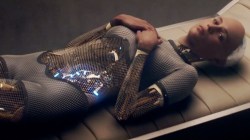Note: “A Liturgical Year in Cinema” is an ongoing series, a personal exploration of the thematic connections between the Christian calendar and films. In the Christian year, January 6 marks the celebration of Epiphany, a commemoration of the revelation of God the Son as a human being in Jesus Christ.
Bodies are gross. At least that’s what I learned growing up in a conservative evangelical environment, where I heard numerous warnings about the dangers of sex, the importance of modest attire, and the apparent biblical equation between “flesh” and “sin.”
A quick reading of Romans 8 or Galatians 5 drives the point home: flesh = bad. Many evangelicals seem deeply uncomfortable with the human body.
So perhaps it’s not surprising that when it comes to the paradoxical doctrine that Christ is both fully human and fully God, we tend to emphasize the latter over the former. Jesus is “God in a bod.” He’s more akin to an alien Superman than a true human.
We would never actually say this, but many of us find that our distrust of the flesh makes it difficult to see Jesus as fully human, with sweat and tears and hair and odor and desire. And this plays out in our church environments and communities, where it is far easier to talk about incarnational community than actually live in flesh-and-blood intimacy with one another. It’s easier to send an email or text message than have a face-to-face confrontation. It’s simpler to catch the sermon via podcast or video than make a commute to the building filled with faces and strangers.
Yet if Jesus was fully human—not just God with a skin suit, but an actual human being—then perhaps we need a fuller understanding of God’s fleshly revelation and our response as flesh-bearers.
 Universal Pictures International
Universal Pictures InternationalTwo recent science-fiction films, Alex Garland’s Ex Machina (2015) and Spike Jonze’s Her (2013), point to our innate human desire for embodiment in a disembodied technological culture. Both stories build on themes from seminal sci-fi films, in which humans seek hope and salvation in artificial intelligence and technology—movies like Lang’s Metropolis or Kubrick’s 2001: A Space Odyssey.
In Ex Machina, a young programmer, Caleb, wins a contest enabling him to spend a week with Nathan, a technological guru and CEO of an Internet company. Nathan has invited Caleb to be part of a Turing test with Ava, a beautiful robot with exemplary artificial intelligence capacities. As Caleb gets to know Ava through conversations, he clearly begins to develop an emotional attachment, despite her clear robotic (yet feminine) figure.
Caleb’s affections for Ava mirror Theodore’s romance with Samantha in Her, where lonely Theodore falls in love with his OS (operating system), Samantha. After his marriage crumbles, Theodore turns to the latest technology for solace, finding the perfect romantic companion in Samantha, who adapts herself to Theodore’s personality and desires. The power of Spike Jonze’s script lies in its ability to make audiences believe in the romance between Theodore and his OS; there is a sense of genuine affection and empathy between the two, despite Samantha being a small device akin to an iPod and the HAL-9000.
One significant difference between these two robotic love interests is the presence of a body—Ava has one, while Samantha doesn’t. Samantha attempts to correct this deficiency by hiring a human surrogate for Theodore in their love-making attempts, which feels awkward and ironically robotic. Theodore rejects this move; a surrogate won’t do, because this bodily replacement isn’t Samantha.
 Warner Bros.
Warner Bros.Similarly, Ava’s own body has some fleshly components, but feels incomplete with her mechanics exposed by lack of skin. Late in the film, when she procures skin and hair, she appears more satisfied and approachable, more herself. She’s still a robot underneath, but the presence of skin and flesh makes her complete.
It’s interesting that in both films—where technology is employed as a romantic device—the need for bodies still arises. Apparently it’s not enough to simply see or hear a “person” through text or a voice.
In both Ex Machina and Her, the feminine technologies end up using and rejecting their human suitors, leaving them for greater pursuits. Samantha abandons Theodore for the superior community of the OS world, unhindered by the limitations of human interactions or bodies. Ava flees Nathan’s compound in order to integrate with human society; with her newfound body, she is finally free to be herself.
Both Caleb and Theodore are left isolated and lonely, wounded by their relationship with a disembodied technology. While seemingly superior, the technology ultimately deceives and leaves the user wanting. In Ex Machina, Ava can achieve liberation only through acquiring a human-like body, one which covers her exposed interior and makes her whole. In Her, there is a final glimmer of hope as a human head rests on a flesh-and-blood shoulder while the sun rises over the flickering city landscape.
 Universal Pictures International
Universal Pictures InternationalIn both films, bodies are the sources of salvation.
Sometimes I think God could have been more strategic in how he chose to reveal himself to his creation. Why didn’t he wait until television, when he could have done a two-hour evening special on how much he cares for us and desires relationship with us? Certainly he knew the Internet was coming—he could have created a Facebook account and given us constant updates on his love for us through his statuses, sharing special nuggets of inspirational verses and catchphrases through his Twitter, Instagram, and Tumblr accounts. Wouldn’t the latest technological advancement be far more effective (at least until the next upgrade)?
Instead, the Word became flesh and dwelt among us (John 1). God knew that intimacy, face-to-face contact, lives and stories shared, hugs and kisses, fingertips meeting when hands were held, the brutal blows on hands nailed to a wooden cross—this is the embodiment of divine love. God closed the distance between heaven and earth as he showed up in our world as one of us.
 Warner Bros.
Warner Bros.This love requires presence, the messy flesh-and-blood intimacy of human interactions. God does not communicate his love through abstract theological ideas or mass-media announcements. He communicates his love through flesh and blood. The Avas and Samanthas of our world—the technological avatars—cannot replace the power of fleshly presence.
I think God knows this. It’s the significance of Epiphany, a moment in the Christian calendar where we pause and celebrate the incarnate love of God. Epiphany means “manifestation” or “revelation,” and is typically connected with the visitation of the Magi in the West and the baptism of Jesus in the East. It’s the “aha” moment where humanity recognized God in the flesh.
 Warner Bros.
Warner Bros.We commemorate Epiphany because Jesus the human reveals the divine through his body, not another medium.
Let’s be sure to celebrate this season with flesh-and-blood human beings beside us, following in the footsteps of our human-divine Savior. The human body may sometimes seem gross—but it’s also how God chose to save the world.
Joel Mayward is a pastor, writer, youth worker, and film critic living in Portland, Oregon. The author of three books, you can find Joel’s writings on film and spirituality at cinemayward.com and joelmayward.com. Follow Joel on Twitter: @joelmayward.














